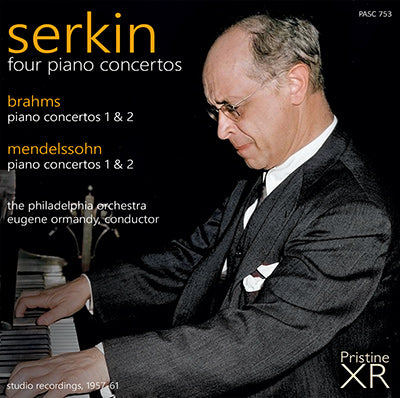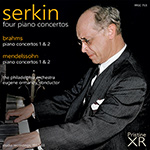
This album is included in the following sets:
This set contains the following albums:
- Producer's Note
- Full Track Listing
- Cover Art
Between 1957 and 1961, Columbia’s microphones at Philadelphia’s Broadwood Hotel captured one of the great partnerships of the post-war concert stage: Rudolf Serkin and Eugene Ormandy with The Philadelphia Orchestra. Across four sessions they set down Brahms’s two monumental piano concertos and the sparkling early concertos of Mendelssohn – performances that remain touchstones of mid-century interpretation. Heard here in new Pristine remasterings, these recordings exemplify a remarkable convergence of artistry, orchestral sheen, and the full-bodied stereo sound of Columbia’s golden era.
By the late 1950s Rudolf Serkin (1903–1991) was firmly established as one of the most respected pianists of his generation. Born in Bohemia into a Russian-Jewish family, trained in Vienna, and mentored by violinist Adolf Busch (later his father-in-law), Serkin combined intellectual rigour with technical mastery and moral seriousness. Having emigrated to the United States in 1939, he became a central figure in American musical life, not least as a guiding force of the Marlboro Music Festival in Vermont. His discography, stretching from the 1930s into the digital age, is vast, but these late-1950s and early-1960s stereo recordings capture him at a moment of peak maturity – seasoned yet vigorous, uncompromisingly clear in thought and execution.
Serkin’s association with Brahms was lifelong. The First Concerto in D minor, Op. 15 – recorded on 10 December 1961 – had been in his repertoire for decades. Originally conceived as a symphony, then as a sonata for two pianos, it finally emerged as one of the most symphonic of all piano concertos, and one of the most demanding. Serkin’s taut, dramatic approach allows the music’s architecture to speak without exaggeration. The orchestral introduction, driven by Ormandy with controlled intensity, sets the stage for a piano entry that joins, rather than dominates, the unfolding drama. In the Adagio, Serkin’s prayer-like simplicity achieves a rapt stillness, while the finale bristles with grit and forward momentum. The result is a performance that balances youthful ardour with hard-won insight.
Brahms’s Second Concerto in B-flat major, Op. 83, recorded on 4 April 1960, is on an altogether broader scale – “a symphony with piano obbligato,” as it has often been described. Its four movements span nearly fifty minutes, requiring both stamina and vision. Serkin brings grandeur without pomposity, from the horn’s opening call and the piano’s answering arpeggios to the exuberant finale. The scherzo’s muscular energy is delivered with leonine force, while the slow movement, with its rapturous cello solo, finds Serkin in conversational interplay with the orchestra’s burnished sonority. The Philadelphia strings, famed for their warmth and sheen, provide a luxurious but disciplined cushion throughout, reminding us why this ensemble was so prized on record.
If Brahms represents the summit of nineteenth-century symphonic thinking, Mendelssohn’s piano concertos sparkle with youthful brilliance. The Concerto No. 1 in G minor, Op. 25, recorded on 19 December 1957, is concise, fleet, and full of verve. Its three movements, played without pause, chart a course from stormy urgency to lyrical song and a dazzling finale. Serkin avoids superficial glitter: every flurry of passagework has meaning, every phrase is shaped with intent. Ormandy and the orchestra match him in agility and freshness, proving that the famed “Philadelphia sound” could be as light on its feet as it was sumptuous.
The Concerto No. 2 in D minor, Op. 40, taped on 8 October 1959, is slightly more expansive, yet retains all of Mendelssohn’s youthful energy. Its opening movement bursts forth with fiery brilliance, followed by a tender Andante and a finale whose playful rondo theme dances with irresistible charm. Serkin dispatches the technical hurdles with unforced ease, but more importantly, he invests the music with clarity, buoyancy, and a refusal to condescend to its youthful spirit. In his hands, these concertos emerge not as salon pieces but as works of lasting substance and vitality.
Eugene Ormandy’s role in these collaborations should not be underestimated. At the helm of The Philadelphia Orchestra from 1936 to 1980, he maintained the sumptuous string sonority cultivated by Leopold Stokowski while tightening ensemble discipline. In these concertos he proves a model partner: supportive yet never self-effacing, alert to Brahms’s symphonic breadth and Mendelssohn’s chamber-like interplay alike. His orchestra, then at its post-war peak, provides a responsive canvas for Serkin’s searching artistry.
Taken together, these four concertos trace a fascinating arc, from Mendelssohn’s early Romantic sparkle to Brahms’s mature grandeur. They also document Columbia’s stereo recording in its prime – spacious, detailed, and in Pristine’s remasterings, newly vivid. For Serkin, they represent milestones in a long and distinguished career, interpretations in which intellect, passion, and integrity converge. More than sixty years on, their vitality and authority remain undimmed.
SERKIN/ORMANDY Brahms & Mendelssohn Concertos
disc one (64:02)
BRAHMS Piano Concerto No. 1 in D minor, Op. 15
1. 1st mvt. - Maestoso (20:25)
2. 2nd mvt. - Adagio (12:43)
3. 3rd mvt. - Rondo. Allegro non troppo (11:23)
Recorded 10 December 1961
MENDELSSOHN Piano Concerto No. 1 in G minor, Op. 25
4. 1st mvt. - Molto allegro con fuoco (6:52)
5. 2nd mvt. - Andante (6:27)
6. 3rd mvt. - Presto - Molto Allegro e vivace (6:12)
Recorded 19 December 1957
disc two (70:58)
BRAHMS Piano Concerto No. 2 in B-flat major, Op. 83
1. 1st mvt. - Allegro non troppo (17:16)
2. 2nd mvt. - Allegro appassionato (8:49)
3. 3rd mvt. - Andante (12:39)
4. 4th mvt. - Allegretto grazioso (9:31)
Recorded 4 April 1960
MENDELSSOHN Piano Concerto No. 2 in D minor, Op. 40
5. 1st mvt. - Allegro appassionata (8:35)
6. 2nd mvt. - Adagio. Molto sostenuto (8:06)
7. 3rd mvt. - Finale. Presto scherzando (6:01)
Recorded 8 October 1959
Rudolf Serkin, piano
The Philadelphia Orchestra
conducted by Eugene Ormandy
XR remastering by Andrew Rose
Cover artwork based on a photograph of Rudolf Serkin
Stereo recordings made by Columbia Records at the Broadwood Hotel, Philadelphia
Total duration: 2hr 15:00

